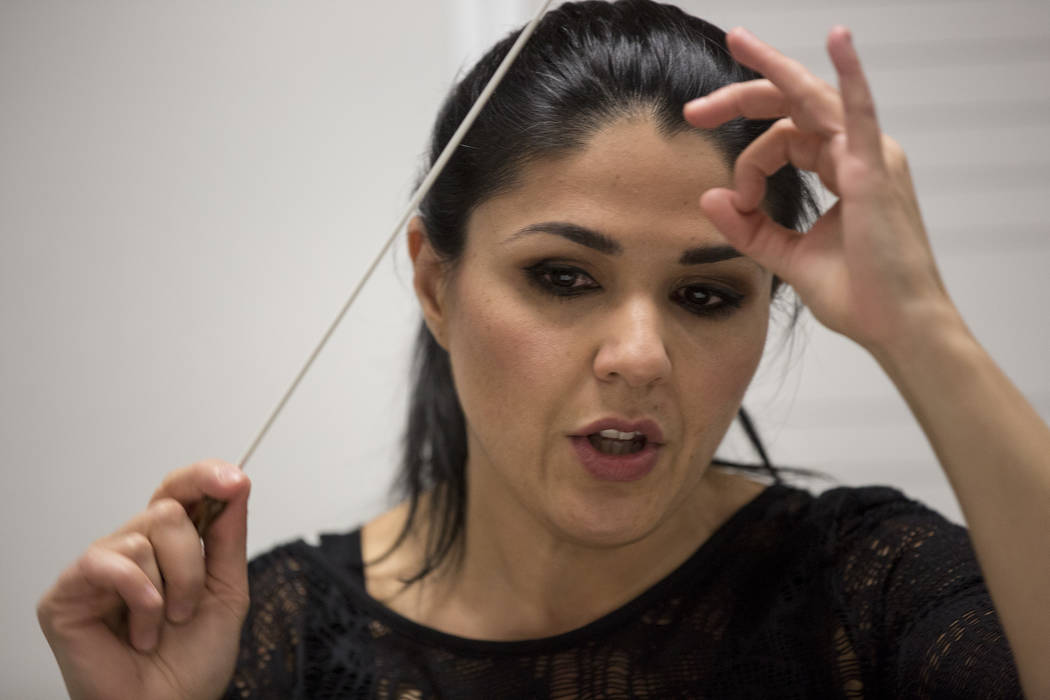Henderson Symphony Orchestra’s first female music director relishing role

After 30 years, the Henderson Symphony Orchestra celebrated a first — the hiring of a female music director.
Brazilian native Alexandra Arrieche comes to the orchestra after years of fighting the stereotypical image of a conductor. Instead of untamed graying hair, she has jet-black hair, and at 35 she’s leading the way into a new season.
“To see music come to life is so beautiful,” Arreiche said. “Music has no gender, no race; it’s really a universal language. It shows that at the end of the day we’re all equal and we’re all human.”
As music director, Arrieche is considered the primary conductor and artistic leader of the orchestra.
Securing a top leadership position as a woman hasn’t been easy. Arreiche spent years studying hand movement techniques, how to set the right tempo and the art of communication through gestures and style, but she still faced plenty of discrimination.
Once, a fellow student told her to stop rehearsing because something was wrong.
“I thought I was doing something wrong with my hands, but it wasn’t that,” Arrieche said. “He said I was too beautiful to be a conductor. He said it looked like I was flirting with the musician. He even told me I should get plastic surgery to make my nose crooked.”
Such statements didn’t stop Arrieche from conducting.
In August, she was chosen to lead the group of 60 to 100 members — mostly volunteers — for the Henderson Symphony Orchestra.
PIPELINE PROBLEM
The gender mix of musicians has noticeably changed since 1978 in large part because of the widespread adoption of blind auditions, according to a September study by the League of American Orchestras.
Women conductors, however, are still rare, especially in the high-status position of music director, the study found. Approximately 10 percent of music directors are female and 25 percent of conductors are female.
“This has historically been at least partly a pipeline issue,” said Rachelle Schlosser, director of media relations for the League of American Orchestras. “There has been a scarcity of mentors in the field and a lack of support for young girls who want to study conducting. This lack of students has a negative effect on the pool of female applicants as these women progress in their careers. As prejudices begin to erase, girls are more likely to pursue conducting as a career.”
In the still male-dominated world of classical music, Arrieche represents the breaking of stereotypes in a highly skilled profession.
“There’s always prejudice against women in a leadership position. It’s part of the mentality of society,” Arrieche said. “Being a conductor is such a body language-fueled profession that even if I don’t talk my gestures are seen as feminine or masculine, and I have to work to make them neutral.”
Distractions can come in the smallest of forms.
So, before every rehearsal or performance, Arreiche pulls her hair back and never wears jewelry or nail polish.
She also dresses in black — a neutral color that won’t distract from the white baton — and makes it a point to cover up.
Still, Arreiche said, one music critique called one of her performances “sexual,” despite it being about the composer who lost his sister.
“I never take those things seriously,” she said. “I’m not going to look like this forever.”
EARNING RESPECT
Orchestra members say they appreciate Arreiche’s skills and professionalism.
“I think we as musicians just accept her as a professional, and we don’t really think about the fact that she’s a woman,” said Sandy Watson, 59, who plays first violin in the orchestra. “She does have a slightly different mannerism, but we enjoy it.”
Watson said she also likes that Arrieche is willing to experiment.
Last month, the orchestra intertwined music from Sergei Prokofiev’s “Romeo and Juliet” with music from Leonard Bernstein’s “West Side Story” in a nonstop performance that compared the two composers’ interpretations of this classic love story.
John Nasshan, the orchestra’s principal percussionist and timpanist, said Arrieche’s sensitivity, passion and ability to grow is what made her stand out as a musician.
“In the music industry, you will find that it’s still kind of a boy’s club, but Alexandra has such a high level of musicianship that it doesn’t matter if she’s a man or woman,” Nasshan said. “I think we’re breaking through the orchestra wall with her. I really believe she’s going to take us to another level.”
Contact Sandy Lopez at slopez@reviewjournal.com or 702-383-4686. Follow @JournalismSandy on Twitter.